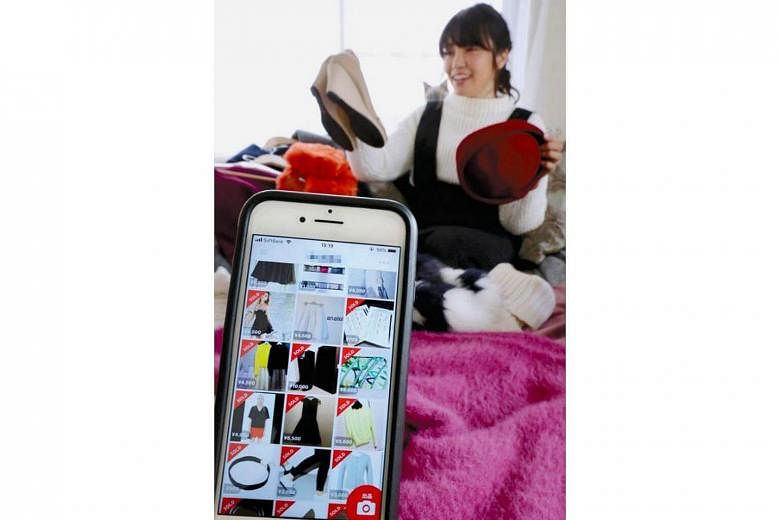TOKYO • More people are buying and selling second-hand items such as clothing and home appliances in Japan, helped by the prevalence of trading apps on smartphones, as well as consumers who are less concerned about owning brand-new goods.
Take 27-year-old Ms Ai Sakai, for instance. Most of the items she uses daily, such as clothing and shoes, were used items bought via popular flea-market app Mercari.
When Ms Sakai, who lives in Tokyo's Taito ward, gets tired of these items, she puts them up for sale on the same app.
She has bought and sold goods more than 3,000 times in the past four years.
"If the quality is the same as one that's new, I like using it better because of how cheap it is," she said.
Before buying new items, Ms Sakai first checks the prices of similar items on the app.
University student Manami Tsujiichi, 22, another user of second-hand items, said: "If the stuff I just bought doesn't work for me, I can sell it immediately."
She added that the market for used items has made it easier for her to buy more things.
The second-hand goods market, excluding cars and motorcycles, was worth about 2.62 trillion yen (S$32.4 billion) in 2016, according to estimates by the Ministry of Economy, Trade and Industry. The market has been growing by leaps and bounds in recent years.
The trend was triggered by the advent of flea-market apps for smartphones in 2012, allowing deals to be made immediately.
The easy-to-use features of such apps make them popular.
Others use auction websites to buy used items.
MM Research Institute, a market research company, predicts that about 2.45 million used phones will be sold in fiscal year 2020 - about 30 per cent more than in 2016.
Department store managers and those in the apparel industry are worried about the second-hand trend. Clothing sales in department stores dropped by 50 per cent last year compared with sales recorded in 1991 - the peak year for department stores.
Isetan Mitsukoshi Holdings, in a bid to cope with such changes, has opened counters at five of its stores for people to sell used goods.
"If the need grows, we will need to consider selling second-hand clothing," said an official of a major apparel-maker.
Mr Shinji Yoshioka, from the Economic and Social Research Institute of the Cabinet Office, said: "Because of the expansion of the market for used goods, even things that could not be priced before can be sold."
He added: "With the revenue that comes from selling used goods, spending will be reborn."
Still, there is a dark side to the trading of used goods.
For the Mercari app, there have been cases where stolen items were offered for sale. There have also been offers to "sell" currency notes to people who cannot borrow money from banks or other ordinary financial institutions.
The operating company behind Mercari in December last year required those who offer items for sale for the first time to register their personal details.
THE JAPAN NEWS/ASIA NEWS NETWORK

